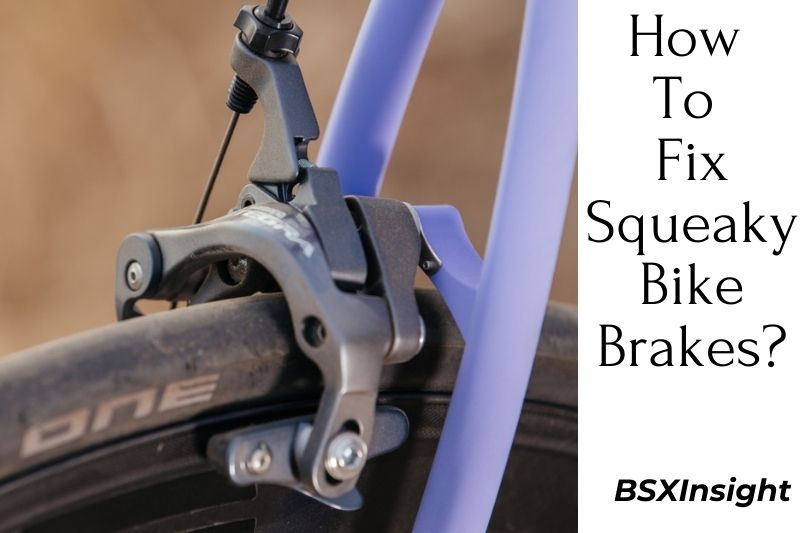When it comes to bike maintenance, one of the most common issues is squeaky brakes. While it may be tempting to ignore the problem, it is essential to fix squeaky brakes as soon as possible. Luckily, there are a few easy tips on how to fix squeaky bike brakes.
What Causes Brakes To Squeak?
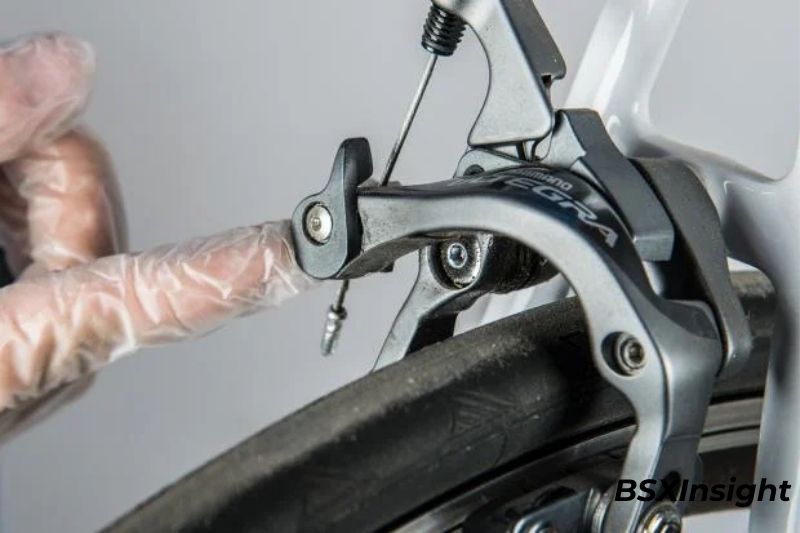
One of the most common causes of brake squeaking is simply a matter of wear and tear. Over time, your brake pads will begin to wear down, and as they do, they will become thinner.
This can cause them to rub against your brake rotors in a way that produces that characteristic squealing sound. In some cases, you may be able to have your brake pads replaced and avoid having to replace your brake rotors as well.
Another common cause of brake squeaking is moisture. If your brake pads or brake rotors become wet, they can rust or corrode.
This can also cause them to squeal when you apply your brakes. If you live in an area where it rains frequently or frequently drive through puddles or other bodies of water, you may want to have your brakes checked more often to ensure that they are not beginning to rust or corrode.
If your brakes are squeaking, it is important to have them checked out by a qualified mechanic as soon as possible. Squealing brakes can be a sign of a serious problem, and if left unchecked, it can eventually lead to the complete failure of your braking system.
Brakes that aren’t adequately adjusted might also create vibration and the dreaded screech. You can do a few things to lessen the chances of noisy brakes, and we’ll go through them below for both rim and disc brakes.
This guide may provide some tips and instructions for you: How To Adjust Bike Brakes.
How To Fix Squeaky Bike Brakes?
Cause 1: Improper Alignment
If your brakes are squeaking, it’s likely because the brake pads are improperly aligned with the rim. This can be a result of improper installation or the brake pad itself wearing down unevenly and beginning to squeak. In either case, it’s important to get your brakes checked and fixed as soon as possible to avoid any accidents.
Fix
You will need an allen key to fix this. First, take a look at how much brake pad is left. Then, examine the pad to make sure it is not too worn. You may need to get new pads, which are not expensive. With the still good pad or a new set, place them so that they are “toed-in”. This means that the front is slightly closer to the rim while the rear is slightly further away.
Place a penny on the rearward side between the pad and the rim to brake effectively. While doing this, ensure the pad comes into contact directly with the rim and does not touch the tire. Also, hold the penny in place with one hand as you tighten the bolt with the other hand. This will ensure that the pad does not rotate while you are braking.
After you finish adjusting both sides and confirm that they are sufficiently toe-in and tight, give it a test drive. If they are still quite loud, give them a bit more toe-in.
Cause 2: Contamination
Oil Residue – can build up on both rim and disc brakes, causing them to squeak. This is especially a problem with rim brakes, as the oil can contaminate the rim.
Fix
If your brakes aren’t performing as well as they used to, an easy fix is to clean the braking surface with a rag and some rubbing alcohol. Lightly dampen the cloth with alcohol and thoroughly wipe the braking surface on the rim or the rotor. You will see black residue on the rag from the rim or rotor, which you want to get off. This will also help you to stop quicker.
Debris – If you’re noticing your brakes squeaking more than usual, it could be due to debris build-up on the pads. This can happen when riding through wet and dirty conditions, as water and mud can splash up onto the rim or rotor and then transfer onto the pads. If left unchecked, this debris can eventually cause poor braking performance. To keep your brakes in good working order, be sure to clean them regularly and inspect for any build-up of debris.
Fix
If you want to get better access to the pads on your bicycle, take the wheel out of the frame. Then, use a coarse piece of sandpaper to remove the top layer of the pad. You may see bits of metal, along with other debris, caked into the pad. Remove all of this so that you are left with just straight rubber. You shouldn’t have to take too much off, but if you do and there isn’t much pad left, just replace it. It’s easier to replace stuff ahead of time, because if you wear the pad all the way through, it can damage the rim.
The harder material of disc brake pads means they don’t sand well with sandpaper, so you’ll want to try scraping any debris or oils off the pad with a rag or rubbing alcohol. This is a bit more involved, but if you can take the pads out of the caliper to do it, it may be worth it just to replace them at this point.
What’s The Difference Between Rim And Disc Brakes?
Brakes On The Rims
Because contamination is a common source of squeaky brakes, make sure the rims are free of oil and grime and scrub them thoroughly with a degreaser if necessary. After that, please ensure the brake blocks are clean and free of dirt or grit.
Also, make that the brake blocks are wearing evenly and aren’t worn out; if they’re not, it could indicate that the brakes aren’t set up correctly.
Check that all bolts holding the caliper to the frame and the brake blocks to the caliper are tightly tightened after this cleaning procedure — loose bolts can cause brake noise.
Cleaning the rust on the bike maybe is a way to prevent breaks. Read this article to see more tips: How To Get Rust Off A Bike.
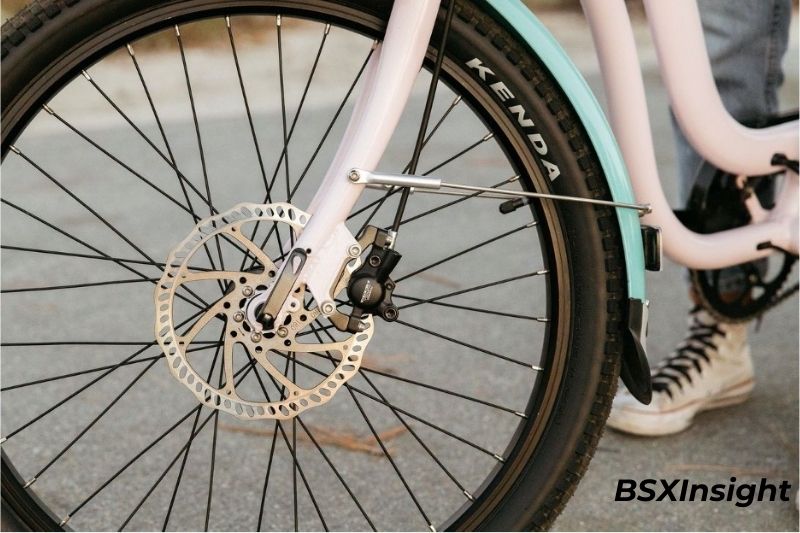
Common Problems With Rim Brakes
Are you still getting a squeal after all that is cleaning and tightening? Then it’s possible that your brakes aren’t correctly adjusted. Apply the brake and examine how the rim and block surfaces connect; loosen the mounting nuts and rearrange the blocks to achieve a proper connection.
A tiny amount of play in the wheel bearings might also contribute to noisy brakes, and the reasons stated above.
Discs Brakes
Contamination, like rim brakes, is the most typical cause of squeaky disc brakes. When spray lubricants are used on a bicycle with disc brakes, and part of the oil gets on the rotors or pads, this can happen — extreme caution is required if you use such products.
Cleaning your rims or rotors using an oil-free cleanser and sanding down your brake pads will assist in reducing brake squeals. You can buy disc brake cleaners to keep them clean and contaminant-free, which will usually suffice, but if the disc pads have become contaminated, you’ll need to take them from the bike and sandpaper them down.
If this does not work, you may need to purchase new pads.
How Do You Set Up Disc Brakes On A Bike?
Setting up disc brakes differs from setting up rim brakes, and improperly setting up disc pads can significantly impact performance. The ideal technique to bed pads in is to ride along at a good pace while squeezing the brakes strongly — repeat this process several times to ensure the discs are well-bedded.
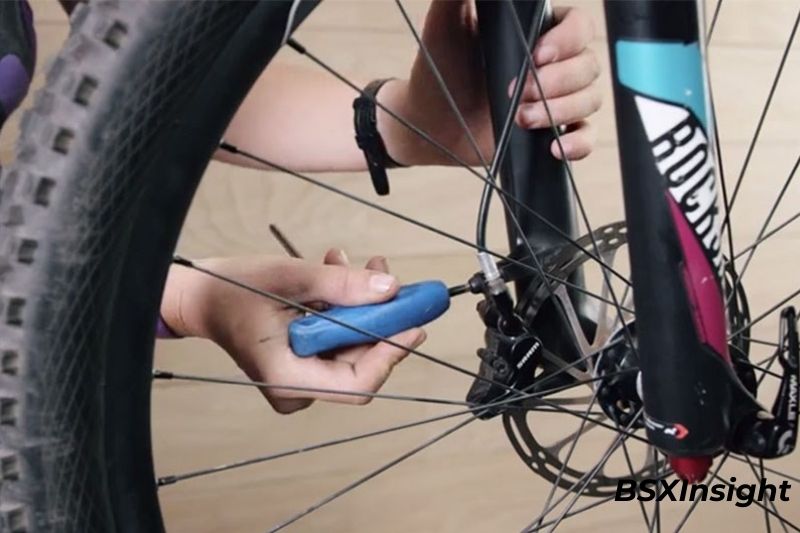
It’s possible that the caliper isn’t completely aligned with the rotor if none of the above works. Disc rotors can readily bend, but they can be straightened with an adjustable spanner, and the eye can adjust the caliper and disc rotor.
The techniques outlined above should eliminate the squeak, but if all else fails, take your bike to your friendly neighborhood bike shop and ask them to fix it.
Pro Advice
It’s best not to contact the brake pads with your hands too much because this can lead to contamination.
The rotors and wheels are misaligned due to an improperly placed axle.
Keep in mind that screaming brakes are present for a variety of causes. When you hit the anchors, contamination ensues. When there is oil and filth on the wheel rim, this happens. Misalignment of the rotors and brake discs might also be a factor.
You may quickly fix noisy bike brakes after determining the cause and following the outlined techniques. You may also watch this video for a more detailed explanation.
FAQs
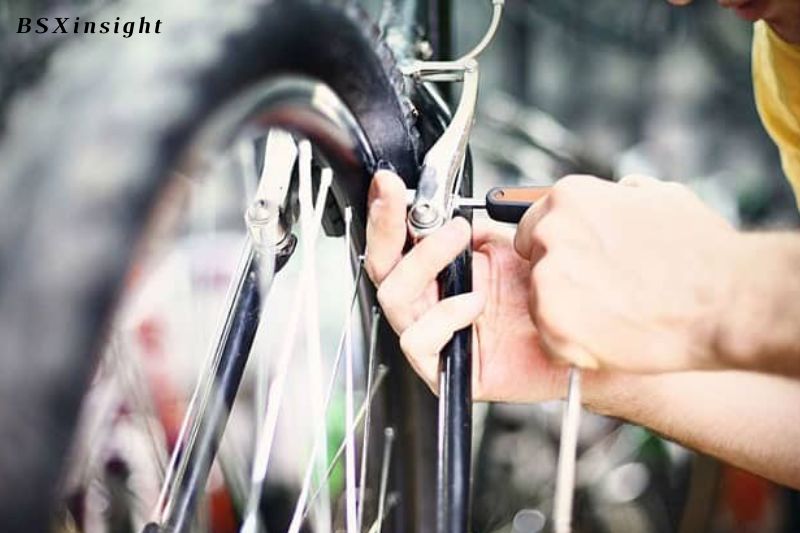
Is it OK to put WD40 on my bicycle brakes?
WD40 should only be used to clean your bike’s interior metal parts before assembling and lubricating them. Other elements of your bike, especially the brake pads, should never be treated with WD40. Contamination will occur if you use oil on your bike’s brake pads or rotors.
What can I do to make my front brakes stop squeaking?
If your brakes are brand new and still squeaking, lubricating the contact points could be the solution. The brake pads must be removed from the calipers, and brake lubricant must be applied to all contact points. The backside of the brake pad and any contact areas on the caliper carrier fall into this category.
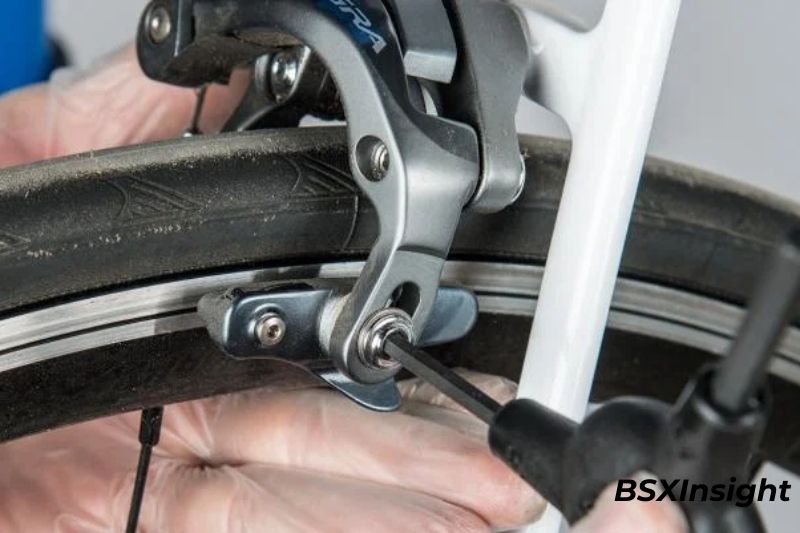
Should I lubricate my bike’s brakes?
Nowadays, most brake and shift cables have a plastic lining incorporated into the housing, obviating the need for lubrication. If you ride in rainy weather frequently or have an older bike without a plastic coating, you should oil the cables to avoid rust.
What causes brakes to squeak after they’ve been replaced?
Metal fibers can cause brakes to be noisy.
Metal fibers can be found in several brake pads. Squeaking can be caused by a location on the pad where the metal fibers are too close together. The pad will usually wear out beyond this point, and the squeaking will stop.
What do bicycle brakes squeak when stopping?
It’s very annoying when your bicycle brakes squeak, not only because of the sound but also because they will affect the way you stop your bike.
Conclusion
Now that you have reviewed this guide to squeaky bike brakes, you will be able to take action and resolve your issues quickly. Hopefully, you will be able to resolve your squeaky bike brake problem once and for all. If you would like to get more tips and advice about the bike, stop by the BSXInsight website.

